- Home
- Stephen Hawking
George's Secret Key to the Universe Page 4
George's Secret Key to the Universe Read online
Page 4
George jumped in fright and fell off the sofa. “What was that?” he shouted to Eric.
“Oops!” said Eric, who was typing away on Cosmos. “Sorry about that. I wasn’t expecting to take a direct hit.”
“You should be more careful,” said Cosmos crossly. “This isn’t the first time we’ve had an accident.”
“What was it?” asked George, who found he was clutching a small teddy bear that Annie must have left on the sofa. He was feeling rather dizzy.
“We were hit by a tiny comet,” admitted Eric, who was looking a little sheepish. “Sorry, everyone. I didn’t mean for that to happen.”
“A tiny what?” asked George, feeling the room spin around him.
Eric typed a few more commands into Cosmos. “I think that’s enough for today,” he said. “Are you all right, George?” He took off his glasses and peered into George’s face. “You look a little green.” He sounded worried. “Oh dear, I thought this was going to be fun. Annie!” he called into the kitchen. “Can you bring George a glass of water? Oh dear, oh dear.”
Annie came in, walking on tiptoe. She was carefully holding a very full teacup of water, some of which was sloshing over the side. Freddy the pig was glued to her side, casting adoring glances up at her with his piggy eyes. She held the cup out to George.
“Don’t worry,” she said kindly. “I felt really sick too, my first time. Dad”—it was a command—“it’s time to let George go home now. He’s had enough of the Universe.”
“Yes, yes, I think you’re right,” said Eric, still looking concerned.
“But it was so interesting!” protested George. “Can’t I see some more?”
“No, really, I think that’s enough,” said Eric hurriedly, putting on a coat. “I’m going to walk you back to your house now. Cosmos, you’re in charge of Annie for a couple of minutes. Come on, George, bring your pig.”
“Can I come back?” said George eagerly.
Eric stopped fussing around with coats and keys and outdoor shoes and smiled. “Certainly,” he said.
“But you must promise not to tell anyone about Cosmos,” Annie added.
“Is it a secret?” asked George, eagerly.
“Yes,” said Annie. “It’s a huge great big ginormous amazing secret that is a trillion gazillion times bigger than any secret you’ve ever heard before.”
“Now, Annie,” said Eric sternly, “I’ve told you that gazillion is not a real number. Say good-bye to George and his pig.”
Annie waved and gave George a smile.
“Good-bye, George,” said Cosmos’s voice. “Thank you for making use of my exceedingly powerful capacities.”
“Thank you, Cosmos,” said George politely.
With that, Eric ushered him and Freddy into the hallway and out of the front door and back to their real lives on planet Earth.
The next day at school, George couldn’t stop thinking about the wonders he had seen at Eric’s house. Enormous clouds and outer space and flying rocks! Cosmos, the world’s most powerful computer! And they all lived next door to him, George, the boy whose parents wouldn’t even let him have an ordinary computer in the house. The excitement was almost too much to bear, especially now that George was sitting once more at his very boring desk in the classroom.
He doodled on the schoolbook in front of him with his colored pencils, trying to sketch Eric’s amazing computer—the one that could make a window from thin air, and through that window show you the birth and death of a star. But even though George could see it perfectly in his mind, his hand found it difficult to draw a picture that looked anything like what he had seen. It was very annoying. He had to keep crossing parts out and drawing them again, until the whole page looked like one giant squiggle.
“Ow!” he exclaimed suddenly as a missile made of a scrunched-up ball of paper hit him on the back of the head.
“Ah, George,” said Dr. Reeper, his teacher. “So, you are with us this afternoon after all. How nice.”
George looked up with a start. Dr. Reeper was standing right over him, staring down through his really smeared glasses. There was a large blue ink stain on his jacket, which reminded George of the shape of an exploding star.
“Do you have anything to say to the class?” said Dr. Reeper, peering down at George’s notebook, which George hastily tried to cover. “Other than ‘Ow!’ the only word I’ve heard you say today?”
“No, not really,” said George in a strangled, high-pitched voice.
“You wouldn’t like to say, ‘Dear Doctor Reeper, here is the homework I spent all weekend slaving over’?”
“Um, well … ,” said George, embarrassed.
“Or, ‘Doctor Reeper, I’ve listened carefully to every word you’ve ever said in class, written them all down, added my own comments, and here is my project, with which you will be extremely pleased’?”
“Uh … ,” muttered George, wondering how to get out of this one.
“Of course you wouldn’t,” said Dr. Reeper heavily. “After all, I’m just the teacher, and I stand here all day saying things for my own amusement and fun, with no hope that anyone will ever gain anything of value from my attempts to educate them.”
“I do listen,” protested George, who was now feeling guilty.
“Don’t try and flatter me,” said Dr. Reeper rather wildly. “It won’t work.” He whipped around sharply. “And give me that!” He shot across the classroom so fast he was almost a blur of speed and snatched a cell phone from a boy sitting at the back.
Dr. Reeper might wear tweed jackets and speak like a man from a century ago, but his pupils were so scared of him, they never tricked him the way they did teachers who were foolish enough to try and befriend them. He was a new teacher and he hadn’t been at the school long, but even on his first day he had quelled a whole room full of students into silence just by staring at them. There was nothing modern or touchy-feely or cozy about Dr. Reeper, with the result that his classrooms were always orderly, his homework came in on time, and even the slouchy rebel boys sat up straight and fell quiet when he walked into the room.
The kids called him “Greeper,” a nickname that came from the sign on his office door, which read DR. G. REEPER. Or “Greeper the Creeper” because of his mysterious habit of appearing without warning in far-flung corners of the school. There would be a gentle swoosh of thick-soled shoes and a faint smell of old tobacco, and before anyone knew it, Greeper would be bearing down on whatever secret mischief was brewing, rubbing his scarred hands with delight. No one knew how he had managed to cover both hands in red, scaly, painful-looking burn marks. And no one would ever dare ask.
“Perhaps, George,” said Greeper, pocketing the cell phone he had just confiscated, “you would care to enlighten the class as to what the artwork you have been working on this morning represents?”
“It’s, well, it’s … ,” whispered George, feeling his ears become hot and pink.
“Speak up, boy, speak up!” ordered Greeper. “We’re all curious to know quite what this”—he held up George’s drawing of Cosmos so the whole class could see—“is meant to be! Aren’t we, class?”
The other children snickered, delighted that Greeper was picking on someone who wasn’t them.
At that moment George really hated Greeper. He hated him so much he completely forgot his fear of shame or humiliation in front of the other pupils. Unfortunately he also forgot his promise to Eric.
“It’s a very special computer, actually,” he said in a loud voice, “which can show you what’s happening in the Universe. It belongs to my friend Eric.” He fixed Greeper with a very blue stare, his eyes determined under his tufts of dark red hair. “There are amazing things in outer space, just flying around all the time, like planets and stars and gold and stuff.” George was making the last part up—Eric hadn’t said anything about gold in outer space.
For the first time since George had been in Greeper’s class, his teacher seemed lost for words. He just stood there, h
olding George’s book in his hands, his jaw falling open as he looked at George in wonder.
“So it does work, after all,” he half whispered to George. “And you’ve seen it. That’s amazing …” A moment later it seemed as though Greeper were waking from a dream. He snapped George’s book shut, handed it back to him, and walked to the front of the class.
“Now,” said Greeper loudly, “given today’s behavior, I’m going to assign one hundred lines. I want you to write neatly and clearly in your books: I will not send text messages in Doctor Reeper’s class because I am too busy listening to all the interesting things he has to say. One hundred times, please, and anyone who hasn’t finished by the time the bell rings can stay behind. Very good, get on with it.”
There was an angry muttering from the classroom. George’s classmates had been looking forward to seeing him being taken to pieces by the teacher, and instead, they’d all been punished for something quite different, and George had mostly been let off the hook.
“But, sir, that’s not fair,” whined a boy at the back.
“Neither is life,” said Greeper happily. “As that is one of the most useful lessons I could possibly teach you, I feel proud that you’ve understood it already. Carry on, class.” With that, he sat down at his desk, got out a book that was full of complicated equations, and starting flicking through the pages, nodding to himself wisely as he did so.
George felt a ruler being jabbed into his back.
“This is all your fault,” hissed Ringo, the class bully, who was sitting behind him.
“Silence!” thundered Greeper, without even looking up from his book. “Anyone who speaks will do two hundred lines instead.”
His hand whizzing across the page, George finished the one hundred lines in his neat writing just as the bell rang for the end of class. Carefully he tore out the page with the picture of Cosmos on it and folded it up, tucking it into a back pants pocket before dropping his book on Greeper’s desk. But George hadn’t taken even two steps down the hall before Greeper caught up with him and barred his way.
“George,” said Greeper very seriously, “this computer is real, isn’t it? You’ve seen it, haven’t you?” The look in his eyes was frightening.
“I was just, um, making it up,” said George quickly, trying to wriggle away. He wished he hadn’t said anything at all to Greeper.
“Where is it, George?” asked his teacher, speaking slowly and quietly. “It’s very important that you tell me where this amazing computer lives.”
“There is no computer,” said George, managing to duck under Greeper’s arm. “It doesn’t exist—I just imagined it, that’s all.”
Greeper drew back and looked at George thoughtfully. “Be careful, George,” he said in a scarily quiet voice. “Be very careful.” With that, he walked away.
The way home from school was long and hot; the unexpected heat of the early autumn sun was beating down on the asphalt, turning it soft and squishy under George’s feet. He trudged along the pavement while big cars whizzed past him, leaving smelly fumes behind them as they went. In some of these enormous, shiny monsters sat the smug kids from school, watching DVDs in the backseat as their parents drove them home. Some of them made faces at George as they drove past, jeering at him for having to walk. Others waved happily, as though he would somehow be pleased to see them as they shot off into the distance in their vast gas-guzzlers. No one ever stopped and offered him a lift.
But today he didn’t mind. He had plenty to think about on his walk home, and he felt glad to be alone. His mind was full of clouds in space, huge explosions, and the millions of years it took to make a star. These thoughts took him far, far across the Universe—so far, in fact, that he completely forgot an important fact about his life on planet Earth.
“Hey!” He heard a shout behind him, and it snapped him back to the here and now. He hoped it was just someone shouting in the street, a random noise that had nothing to do with him. He hurried along a little faster, clutching his school bag snugly to his chest.
“Hey!” He heard it again, this time a little closer. Resisting the urge to look back, he sped up his pace. On one side of him was the busy main road, on the other the city park, which offered nowhere to hide. The trees were too thin and straggly to stand behind, and going anywhere near the bushes was a bad idea. The last thing he wanted was to get dragged into them by the boys he feared were behind him. He kept going, getting faster every minute, his heartbeat thumping in his chest like a bongo drum.
“Georgie boy!” He heard the yell and his blood curdled. All his worst fears were confirmed. Usually when the end-of-school bell rang, George shot out of the gates and was well on his way home while the larger, slower boys were still flicking rubber bands at each other in the coatroom. He’d heard the awful stories of what Ringo and his followers did to the kids they caught on the street. Eyebrows shaved off, hung upside down, covered in mud, left up a tree wearing only underwear, painted in indelible ink, or abandoned to take the blame for broken windows—all were whispered tales at school of Ringo’s reign of terror.
But on that sunny, drowsy autumn afternoon, George had made a terrible mistake. He was walking home too slowly just when he’d given Ringo and his friends a reason to come looking for him. Angry with him for landing them with extra work in Greeper’s class, they were now clearly on his tail and ready to take revenge.
George looked around. Ahead of him he saw a group of mothers pushing carriages toward an intersection, where a crossing guard stopped the traffic to let people across. Scurrying forward, he joined the moms and babies, managing to insert himself into their midst so that he was surrounded by strollers. Ambling across the road while the crossing guard held up her bright yellow sign, George tried to look as though he belonged to one of the mother-and-baby groups. But he knew he wasn’t fooling anyone. As he passed the crossing guard, she winked at him and said under her breath, “Don’t worry, dear, I’ll hold ’em back for you for a minute. But you run along home now. Don’t let those nasty boys catch you.”
When George reached the other side of the road, to his surprise the crossing guard leaned her sign against a tree and stood there, glaring back at Ringo and his friends. The roar of the traffic started up again, and as George sped away he heard another menacing shout.
“Hey! We gotta get across—we need to get home and do our … schoolwork … . If you don’t let us cross, I’ll tell my mother and she’ll come and straighten you out.”
“You watch yourself, Richard Bright,” grumbled the crossing guard, walking slowly out into the road with her sign.
George turned off the main road, but the sound of heavy thudding feet behind told him they knew which way he’d gone. He was hurrying down a long tree-lined alley that ran behind the gardens of some very big houses; for once it was empty of adults who might have saved him.
George tried a few of the doors in the fences, but they were all firmly locked. He looked around in a panic and then had a flash of inspiration. Grabbing on to the lowest bough of an overhanging apple tree, he hoisted himself up high enough to gain a foothold on the top of the fence and leaped right over it. He landed in a large prickly bush, which scratched him, ripping his school uniform. As he lay groaning silently in the shrubbery, he heard Ringo and his friends pass by on the other side of the fence, making spine-chilling comments about what they’d do to George when they got their hands on him.
George stayed still until he was sure they’d gone. Wriggling free of his school sweater, which was hopelessly tangled in the spiky bush, he struggled out of the clinging branches. His pants pockets had emptied their contents onto the ground. He scrabbled around, trying to pick up all his important things. Then he emerged from the undergrowth onto a long, flat green lawn, where a very surprised lady lay in a deck chair, sunbathing. She lifted up her dark glasses and looked at him.
“Bonjour!” she said in a nice voice. She pointed toward the house. “Go zat way—ze gate is not so locked.”
&
nbsp; “Oh, merci,” said George, remembering his one word of French. “And, um, sorry,” he added as he rushed past her and ran along a passage by the side of her house. He went through the gate, came out onto the road, and set off for home, limping a little because he’d twisted his left foot. The streets were quiet and sleepy as he hobbled along. But the silence didn’t last long.
“There he is!” A great cry went up. “Georgie-boy!” he heard. “We’re coming to get you!”
George gathered the last of his strength and tried to get his legs to move fast, but he felt as though he were wading through quicksand. He wasn’t far from home—he could see the end of his road—but Ringo and his gang were gaining on him. He plowed bravely forward, reaching the corner just as he thought he might collapse on the pavement.
“We’re gonna kill you!” Ringo shouted from behind him.
Staggering, George tottered down his street. His breathing had gone all funny—the air was going in and out of his lungs in great swooshing gasps. All the scratches and bruises and bumps he’d gotten running away from Ringo were hurting, his throat was parched, and he was exhausted. He couldn’t have gone much farther, but he didn’t need to—he was home. He’d reached the green front door without being turned into ground meat, or something worse, by Ringo and his terrible friends, and now everything was going to be all right. All he had to do was reach into his pocket and find his key to unlock the front door.
But it wasn’t there.
He turned out his pockets and found all his treasures—a marble, a Spanish coin, a length of string, a model red sports car, and a ball of fluff. But no key. He must have dropped it in the bushes when he climbed over the fence. He rang the bell, hoping his mom might have come home early. Ting-a-ling-ling-ling! He tried again. But there was still no answer.
Seeing him standing there, Ringo realized he’d won. He plastered a hideous smile on his face and started to saunter confidently toward George. Behind him, eager for trouble, came his three weasel-faced, hard-knuckled friends.

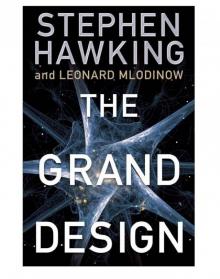 The Grand Design
The Grand Design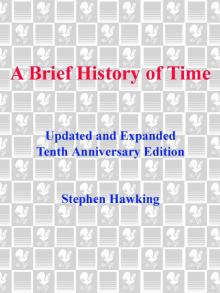 A Brief History of Time
A Brief History of Time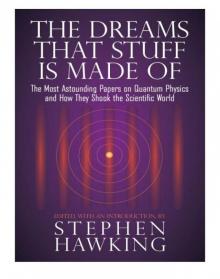 The Dreams That Stuff is Made of
The Dreams That Stuff is Made of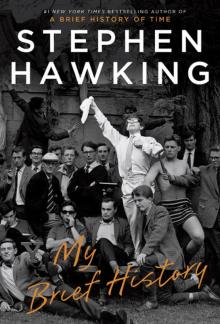 My Brief History
My Brief History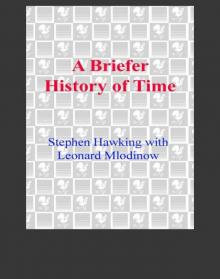 A Briefer History of Time
A Briefer History of Time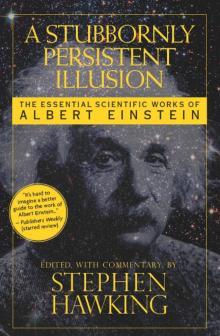 A Stubbornly Persistent Illusion
A Stubbornly Persistent Illusion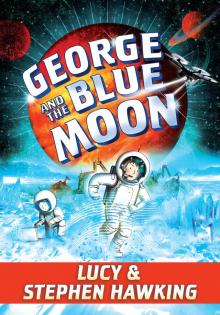 George and the Blue Moon
George and the Blue Moon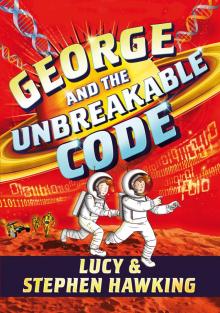 George and the Unbreakable Code
George and the Unbreakable Code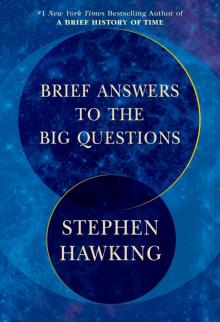 Brief Answers to the Big Questions
Brief Answers to the Big Questions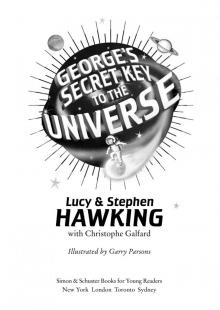 George's Secret Key to the Universe
George's Secret Key to the Universe